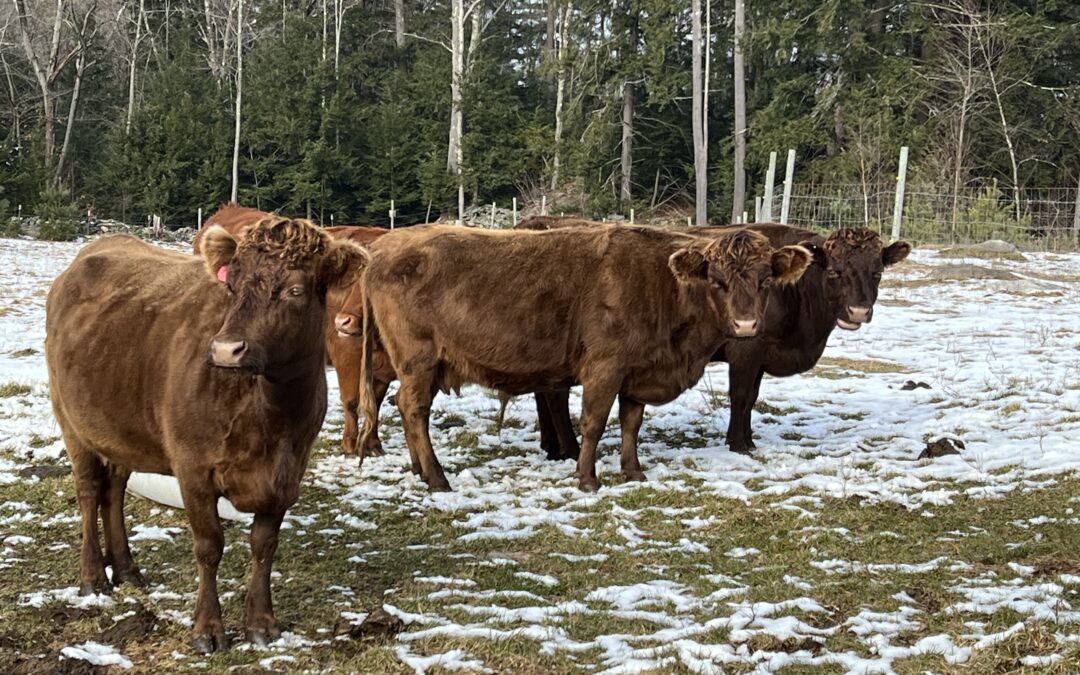Introduction to Dexter Beef
Dexter beef has become a prized choice among gourmet chefs and beef enthusiasts alike, celebrated for its exceptional quality and unique flavor. Originating in Ireland, Dexter cattle are one of the smallest European breeds, known for their adaptability and efficiency. Over the years, their beef has gained a reputation for its superior marbling, tenderness, and sustainable farming practices, making it a top choice for those seeking premium beef.
Unique Traits of Dexter Cattle
Dexter cattle possess several characteristics that set them apart from other breeds:
- Smaller Size and Efficient Grazing: Dexter cattle are compact and require less grazing area, making them ideal for small-scale and sustainable farming.
- Resilience to Different Climates: These cattle thrive in various conditions, from lush pastures to challenging terrains, ensuring consistent meat quality.
- Natural and Sustainable Breeding Practices: Dexter cattle are often raised using traditional, pasture-based methods, contributing to their high-quality beef.
Flavor and Texture of Dexter Beef
Dexter beef stands out for its exceptional flavor and texture:
- Rich Marbling: The intramuscular fat in Dexter beef enhances tenderness and provides a melt-in-your-mouth experience.
- Distinct Flavor Profile: Known for its slightly sweet, robust taste, Dexter beef offers a unique eating experience compared to other breeds.
- Comparison with Other Breeds: Unlike Angus or Wagyu, Dexter beef balances marbling and leanness, delivering a flavor that’s both rich and nuanced.
Nutritional Benefits of Dexter Beef
In addition to its taste, Dexter beef is packed with nutritional benefits:
- High-Quality Protein: Dexter beef provides essential amino acids necessary for muscle growth and repair.
- Healthy Fat Composition: With an excellent balance of Omega-3 and Omega-6 fatty acids, it supports heart health.
- Vitamins and Minerals: Rich in iron, zinc, and B vitamins, Dexter beef contributes to a well-rounded diet.
Dexter Beef and Sustainable Farming
Dexter cattle are a sustainable choice for beef production:
- Lower Environmental Impact: Their smaller size means less feed and water consumption compared to larger breeds.
- Efficient Feed-to-Meat Conversion: Dexter cattle convert feed into high-quality meat efficiently, reducing waste.
- Grass-Fed vs. Grain-Fed: Many Dexter cattle are grass-fed, further reducing the carbon footprint of their production.
How Dexter Beef is Raised
The quality of Dexter beef is a direct result of ethical and sustainable farming practices:
- Pasture-Based Systems: Dexter cattle are typically raised on open pastures, ensuring a natural diet and stress-free environment.
- Ethical Farming Practices: Humane treatment and low-stress handling improve meat quality.
- Impact on Meat Quality: The farming methods used directly influence the flavor, texture, and nutritional profile of Dexter beef.
Comparison with Other Beef Breeds
Dexter beef holds its own against popular breeds:
- Angus vs. Dexter: While Angus is known for its marbling, Dexter offers a more balanced fat-to-meat ratio with a distinct flavor.
- Wagyu vs. Dexter: Wagyu’s extreme marbling contrasts with Dexter’s tender yet leaner cuts, appealing to different tastes.
- Small-Scale Farming: Dexter cattle’s adaptability makes them ideal for smaller farms, where attention to quality is prioritized.
Popular Cuts of Dexter Beef
Dexter beef offers a variety of cuts to suit every cooking style:
- Ribeye and Striploin: These premium cuts highlight the rich marbling and tenderness of Dexter beef.
- Brisket and Short Ribs: Perfect for slow-cooking, these cuts bring out the beef’s robust flavor.
- Ground Beef: Versatile and flavorful, Dexter ground beef elevates burgers, meatballs, and more.
Cooking Dexter Beef for Optimal Flavor
To fully enjoy Dexter beef, it’s important to cook it correctly:
- Best Cooking Techniques: Grilling, pan-searing, and slow-cooking are ideal methods for bringing out its flavor.
- Tips for Retaining Tenderness: Avoid overcooking and let the beef rest before serving to retain its juices.
- Pairing Suggestions: Dexter beef pairs well with roasted vegetables, creamy mashed potatoes, and full-bodied red wines.
The Gourmet Appeal of Dexter Beef
Dexter beef is a favorite in gourmet circles for several reasons:
- Chefs’ Preference: Its flavor and texture make it a sought-after ingredient in fine dining.
- Fine Dining Restaurants: Many high-end establishments feature Dexter beef on their menus.
- Testimonials: Food critics and chefs consistently praise Dexter beef for its unique qualities.
The Economics of Dexter Beef
While Dexter beef is considered a premium product, it offers great value:
- Premium Pricing: Its superior quality and limited availability justify the higher cost.
- Value for Money: Consumers appreciate the exceptional taste and nutritional benefits.
- Factors Affecting Pricing: Small-scale production and sustainable farming practices contribute to its premium status.
Where to Buy Dexter Beef
Finding high-quality Dexter beef is easier than you might think:
- Specialty Butcher Shops: Many local butchers stock Dexter beef due to its growing popularity.
- Local Farms and Online Stores: Buying directly from farms or trusted online retailers ensures freshness and quality.
- Tips for Selection: Look for deep red color and fine marbling to identify premium Dexter beef.
Common Myths About Dexter Beef
Let’s dispel some misconceptions:
- Myth: Smaller cattle mean less quality.
- Reality: Dexter’s smaller size doesn’t compromise its exceptional flavor and texture.
- Myth: Dexter beef is too expensive.
- Reality: While premium-priced, its quality justifies the cost.
- Myth: Dexter beef isn’t widely available.
- Reality: With growing interest, it’s now more accessible through specialty stores and farms.
Frequently Asked Questions About Dexter Beef
- What makes Dexter beef unique? Its rich marbling, tenderness, and distinct flavor set it apart from other breeds.
- Is Dexter beef more tender than Angus? Yes, Dexter beef is often considered more tender due to its fine marbling and smaller muscle fibers.
- Can Dexter beef be grass-fed and grain-finished? Absolutely. Many farmers use this method to balance flavor and sustainability.
- How long does Dexter beef last when stored properly? When vacuum-sealed and frozen, it can last up to a year without losing quality.
- What are the best recipes for Dexter beef? Grilled ribeye, slow-cooked brisket, and gourmet burgers are just a few great options.
Conclusion
Dexter beef’s superior quality, rich flavor, and sustainable farming practices make it a standout choice for beef lovers. Whether you’re a home cook or a gourmet chef, this unique beef breed delivers exceptional results in every dish. By choosing Dexter beef, you’re not only indulging in premium flavor but also supporting ethical and sustainable farming practices. Try it today and experience the difference for yourself.

